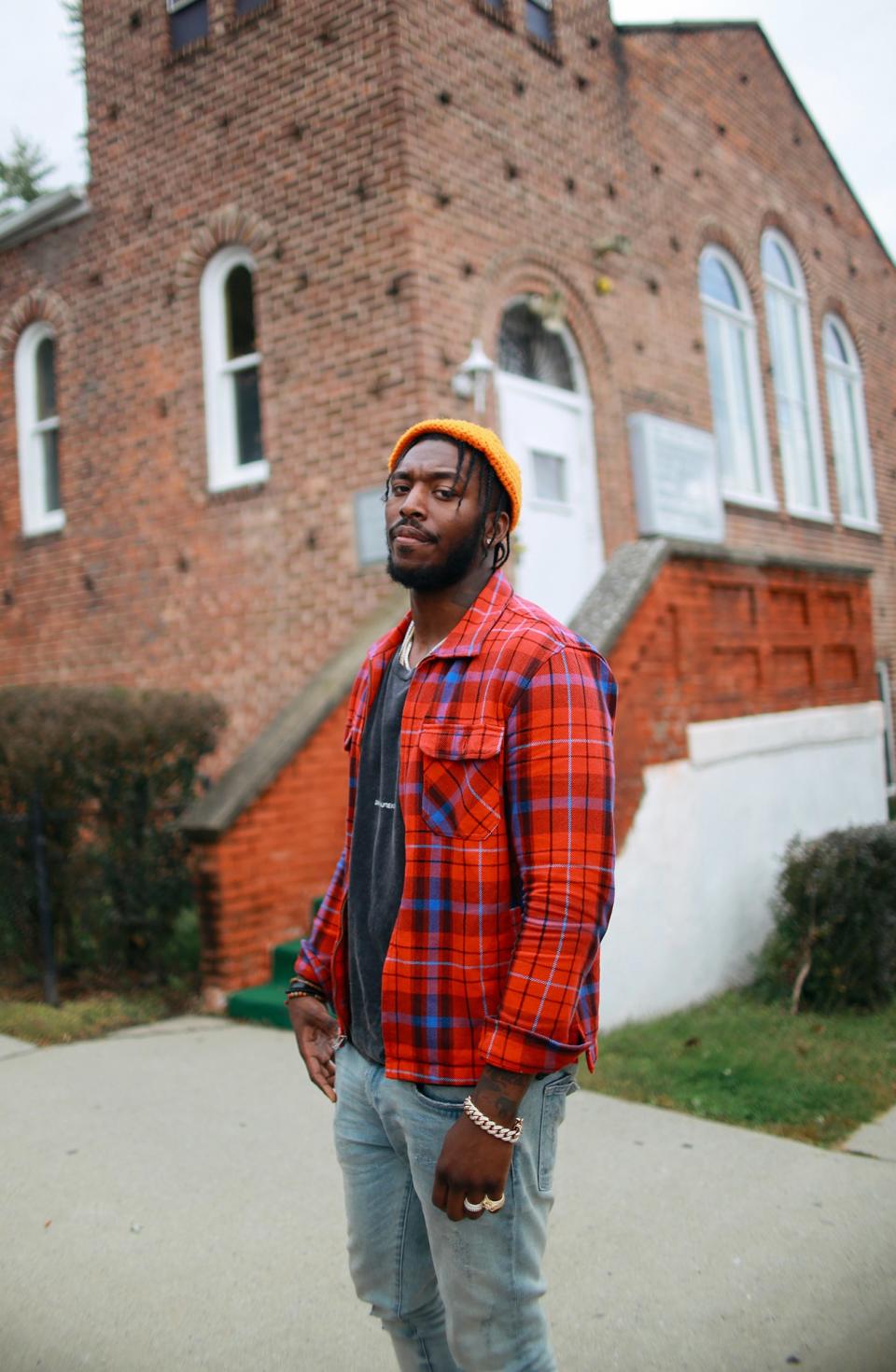First Pardison Fontaine Made Money Moves With Cardi B and Kanye West—Now He's Ready for Stardom of His Own
The first thing you see when you drive into the city of Newburgh is a cemetery. From there, things don’t get much less dead. The small upstate New York city (really, a big town if we’re calling a spade a spade) is one of the most dangerous in America. It is also one of the grayest. Convenience-store Pepsi signs are washed out, home windows are boarded, and yellow billboards advertise their own availability. On an overcast day in late October, Newburgh looks especially desaturated, as though it’s awaiting color-correction.
Around noon, a conspicuously new Jeep Wrangler winds through the ramshackle town and parks in front of Newburgh’s Activity Center. Inside, the beige rec room is set up with rows of plastic fold-out tables and aluminum fold-up chairs. A few dozen local Pop Warner football players, their coach, and their parents are there waiting for the town’s most exciting export, the rapper and songwriter Pardison Fontaine.
Fontaine, who is 6’5” and has distinctive box braids, walks out of his Jeep and into the center, and it’s as though he brings Oz into Kansas. With his race-car-size red Versace sneakers and matching flannel, the sparkling ice around his neck and wrists and on his fingers, and the trademark orange knit beanie atop his head, he’s the most striking figure in the room by a long shot. Someone jams an aux cord into their phone and plays his thumping 2017 single, “For the Win,” on a small, overmatched set of speakers. And Fontaine makes the rounds, shaking hands, signing autographs, and posing for pictures.
Here, at this moment, Fontaine is caught somewhere between who he was and what he is becoming. To some parents, he is still Little Thorpe, a standout basketball player and regular at Soul Saving Station Church. To the children—and, okay, more than a few excited moms—he is a molecular cloud on the cusp of stardom: a writer of hits for the likes of Cardi B and Kanye West, and a rapper who just performed at the BET Awards and has a Billboard Hot 100 single of his own.
Pardi is here to donate swaggy new jerseys (black with a yellow camo accent) to the entire playoff-bound Newburgh Steelers football program and to give the kids a pep talk—about how they can make it despite their less-than-desirable surroundings, about how they should have pride in their hometown, about how he wants to put Newburgh on the map.
And then more selfies. I ask one group of preteen boys if this is exciting, getting to meet Pardison Fontaine. A couple of them nod tepidly. The third boy, who has braces and a big Afro, isn’t satisfied. “Where’s Cardi? I want Cardi.”
Pardison Fontaine is too busy to hear the question. He’s always busy these days. But if he’d heard it, it might’ve caused him to wonder: Is this a question that’ll haunt me forever? Because if one thing is clear about Pardison Fontaine, it’s that he’s done living in the shadow of the words he’s written for others.
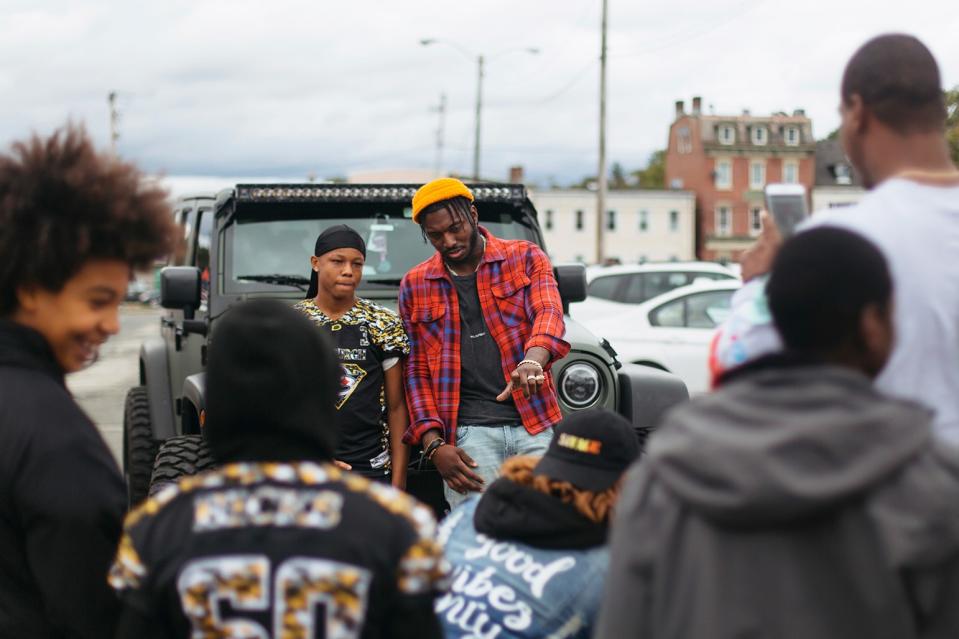
Pardison Fontaine and Cardi B were not a match made in heaven. But they were a match made in Sue’s Rendezvous, a Mount Vernon gentleman’s club that, for those with a predilection for dancers “thick like a malted milkshake with honey and molasses,” was its own celestial paradise.
Back before her days on VH1’s Love & Hip Hop, Cardi was a dancer at the since-shuttered club. At the same time, around 2014, Pardi was trying to make a name for himself as a rapper, and he would sometimes perform at Sue’s. A mutual friend had introduced Cardi to Pardi’s music, and she was a fan. So much so that she recorded a video of herself twerking to Pardi’s song “Oyyy,” which sent Pardi’s tally of followers through the roof.
Thereafter, Pardi and Cardi—whose names rhyme just by coincidence—started spending more time together. Pardi would bring Cardi to Newburgh, sometimes booking her to perform for special occasions. And when Cardi had a notion that she wanted to get serious about music, she turned to Pardi. “I knew she was a personality on Instagram and that people already liked her,” Pardi says. “So I knew there had to be something there. Now, music is more about the relation to the person than the music anyway.”
Any gaps Cardi may have had in technical skill or experience, Pardi helped fill in. His wit and swagger on the mic—"Think I love your baby mama, her pussy get dumb wet / I give your child a stepbrother then teabag your drum set” goes one line from “Oyyy”—naturally lent themselves to Cardi’s brazen persona. And with Cardi’s large following and even larger charisma, Pardi’s words landed in a way they had yet to coming out of his own mouth. The pair collaborated on some warmly received early efforts. It was a fine start.
And then came “Bodak Yellow.” Beyond dominating summer ’17, the song made history: It became the longest-running No. 1 on the Billboard 100 by a solo woman rapper. Its success defied both Cardi's and Pardi’s expectations. “We was just like two kids at the candy store,” Pardi says of the release’s aftermath.
With this spring’s Invasion of Privacy, the success of “Bodak” proved not to be a fluke—for Cardi or for Pardi. The week of Invasion’s release, two of its singles, “I Like It” and “Be Careful,” cracked the top 15 on the Billboard 100. Fontaine has writing credits on both songs. It was around this time that fans started to take note of his name—though not for reasons he and Cardi would’ve liked.
Shortly after the release of the single “Be Careful,” old video surfaced online of Fontaine rapping a verse from the song. Blogs and Internet commenters pounced. Nicki Minaj’s loyalists came out of the woodwork, accusing Cardi of using an uncredited ghostwriter. But instead of flat-out denying the charges, Cardi stood her ground. She pointed out that Fontaine was credited as a co-writer on the song under his given name, Jordan Thorpe. And she’s since spoken candidly about how, throughout her career, Fontaine has helped her to become a more proficient rapper. “I need to learn how to flow a little bit easier and cleaner,” she said in a Beats 1 interview this past spring. “Yeah, I co-wrote, bitch," she said more recently. "I don't give a fuck. All these rappers out here got writers. Even the ones that say they don't. They lying, bitch."
Cardi emerged from the episode unscathed, and Pardi emerged a more recognizable name, both for good and for ill.
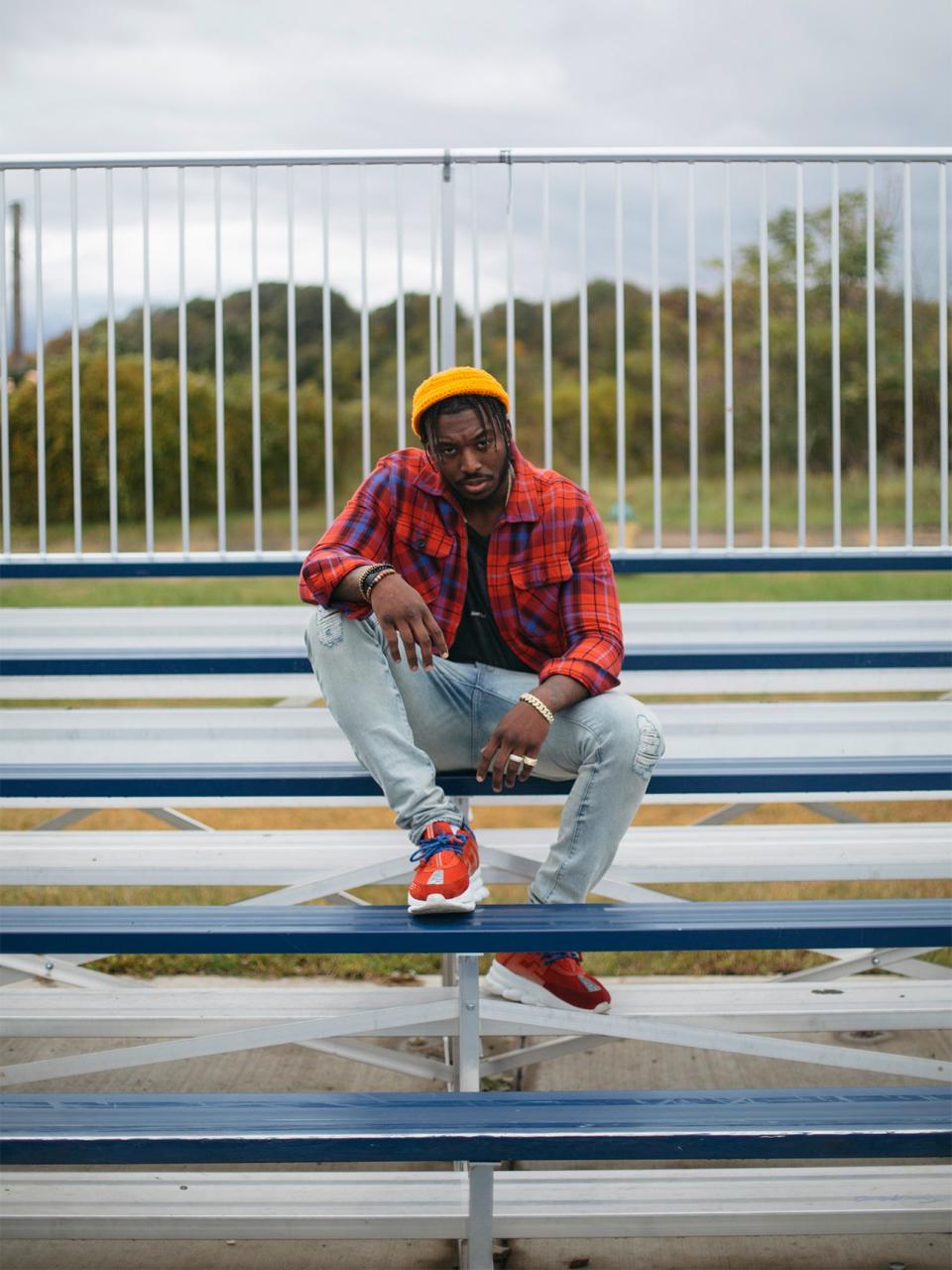
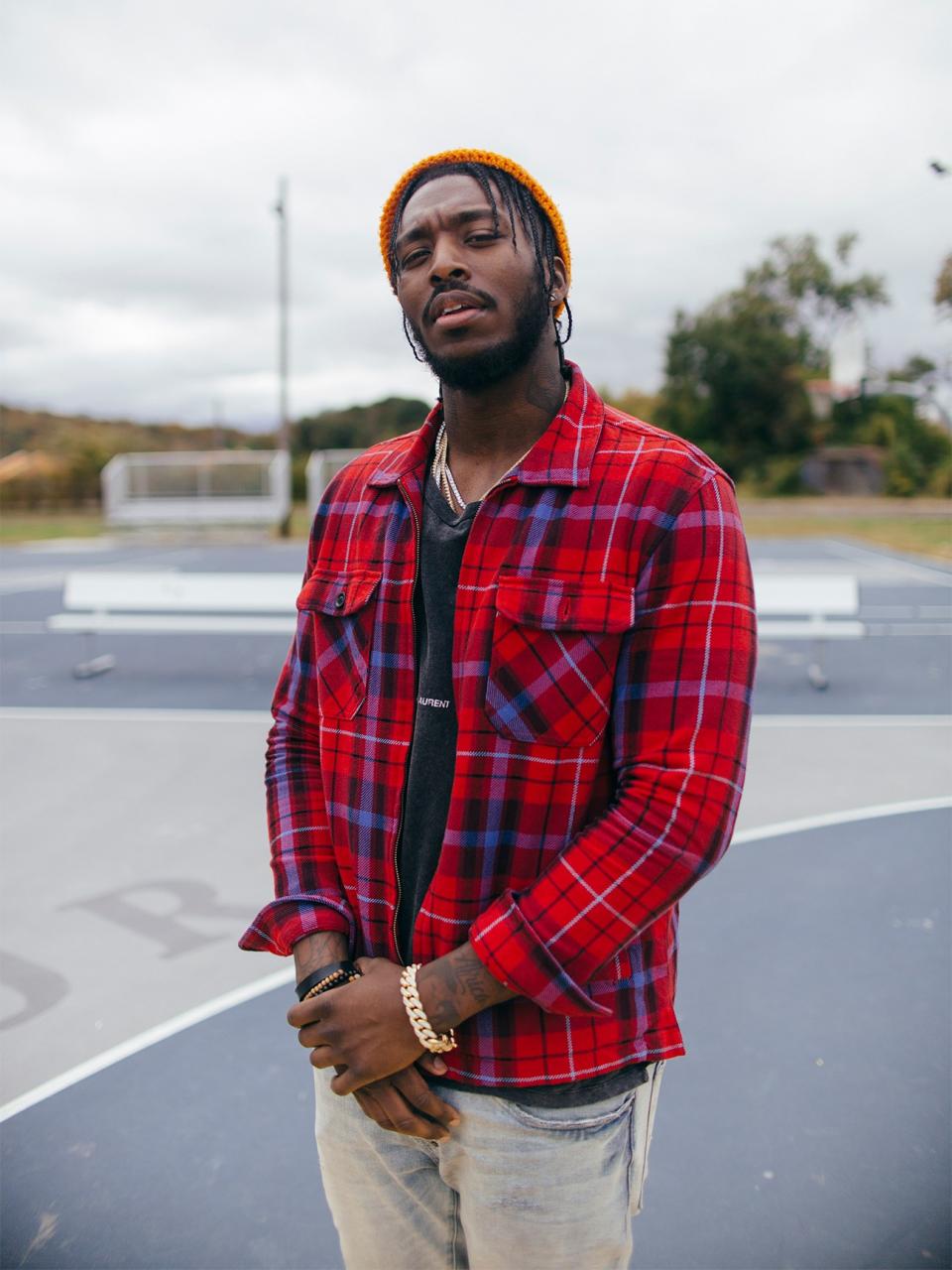
Just up the block from Newburgh’s other cemetery is the basketball court where Pardison Fontaine played growing up. The court is basically a repurposed outdoor lot between two brick apartment complexes. Four baskets, some paint, and a small set of bleachers. It was here that Fontaine got good enough to win a scholarship to play at community college and then at Goldey-Beacom, in Delaware. There he started, put up respectable numbers...and then quit. The decision came suddenly, midway through his junior year. The limits of his hoops potential had dawned on him: At best, he’d make a go of it overseas after school. Increasingly, he didn’t want to be part of a team, though. He wanted to shine on his own.
He’d been recording raps in his bedroom since high school, but, feeling pigeonholed as a basketball player, he stopped hooping altogether. “I was like, 'Yo, I'm not picking up a ball no more. I rap.' I felt like I had to [define my own identity] for people to stop looking at me as a basketball player.”
Originally, Pardi went by Pardi Mcfly on Myspace. But that didn’t quite sound Grammy-worthy. He found an elegant solution on the way to work at Saks Fifth Avenue, when he passed the Anne Fontaine store: Pardi—no, Pardison—Fontaine.
In the years since, Pardi has released the 13-track album Not Supposed to Be Here (2015) and a smattering of singles. Like Cardi, he spits bars in a way that’s reminiscent of rap’s boom-bap past but manages to feel fresh. His quips are cutting and could easily double as Instagram captions: “She likes the fact that I’m six-five / Makes dresses out of my wife beaters.” And in a SoundCloud-inflected landscape full of moaners and mumblers, Pardi’s gruff, emphatic delivery is distinctive. He doesn’t shy away from expressing the unsexy realities of his humble upbringing ("It used to rain in my crib, I had holes in the roof”). Still, his confidence booms. He’s at once a Lothario and an aspirant, and he has a chip on his shoulder. “Hearing weak shit on the radio like ‘How is he on?’ / But even Kobe had to take a seat behind Eddie Jones,” he raps on the song “Mercy.”
Other voices are conspicuously absent in Fontaine’s music. Not Supposed to Be Here doesn’t have a single feature. Fontaine will tell you that his aversion to sharing the mic stems from selfishness. “If you like my shit or you hate it, I wanted it to be because of me,” he told Mass Appeal last year. “I want the credit for my records.”
It’s an ironic sentiment coming from someone whose greatest successes have been in the service of other artists. But when I ask Pardi if he has mixed feelings about the songs he’s written for Cardi outperforming his own songs, he scoffs. “[Cardi] is like a real friend. And also, that's a whole different venture. It's like Fortnight and 2k. You're not going to be mad at your success in one because you're not so good at the other.”
Recently, though, Pardi has been gaining momentum behind the mic. In September, he and Cardi united on the song “Backin’ It Up.” With a brief stint on the Billboard Hot 100 in October, it was Pardi’s most popular song to date by leaps and bounds. When the two friends performed it together at this fall’s BET Awards, it was a glimpse of what Fontaine’s next chapter might look like. Midway through the song, he struts onstage, through a cloud of smoke, looking like a bona fide don: He’s wearing an open black robe and nothing but a pair of ripped jeans and a few chains underneath. He towers over Cardi, who is twerking on her hands and knees. Together they emit a Biggie–Lil Kim vibe. The performance is mesmerizing, a throwback to New York’s hip-hop golden age. And yet, that Pardi only came onstage midway through gave the impression that he was a guest on his own song. He occupied the stage without owning it. And that’s not the impression he’s trying to make.
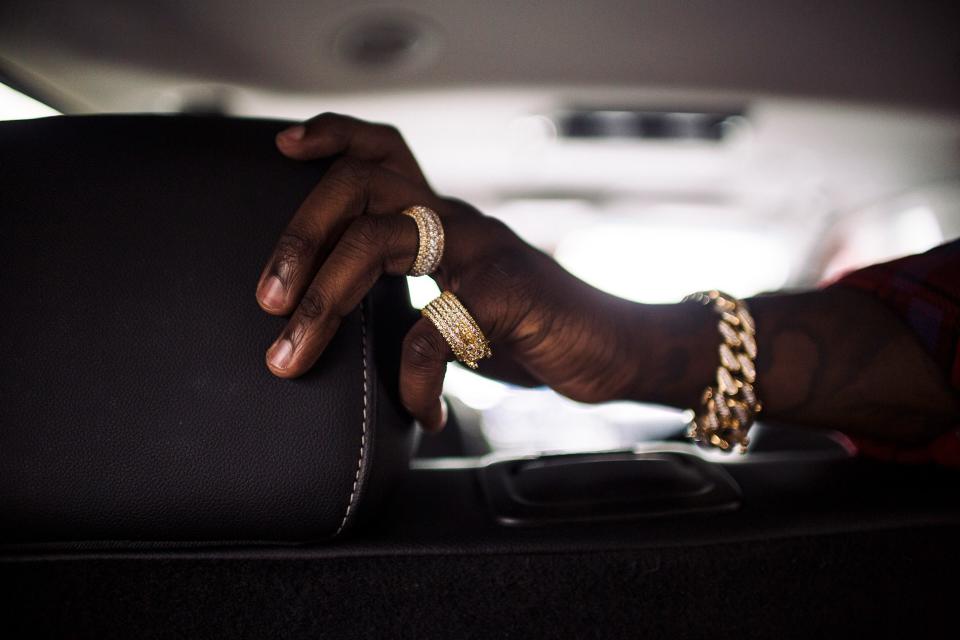
Calabasas, California, is 2,821 miles from Newburgh. But the distance between the two cities is better measured in color. Whereas the browns and grays of Newburgh are pallid and decrepit, the browns and grays of Calabasas are creamy and minimalist, nowhere more so than in Kanye West’s office, which has big stone tables and empty white walls and, sometimes, a chiropractor.
In May, having liked the Pardi-written line “I gotta stay outta Gucci / I'm finna run out of hangers,” on Cardi’s “Drip,” Kanye flew Pardi out to Calabasas to help him with Ye. The week began with Kanye’s aforementioned chiropractor adjusting Pardi; it continued with Kanye laying off his Yeezy heel division (“I'm talking to Elon Musk, and he's trying to build a rocket, and I just show him these heels I made. I feel like this is dumb,” Pardi remembers Kanye saying). And then, well, from the donning of The Hat to the trip to TMZ, you know the rest.
Pardi recounts the surreal experience in vivid detail, impersonating Kanye to a tee. He tells me that being there and actually sitting down and having conversations with Kanye allowed him to see the whole thing differently than he might have if he’d been on the outside. “Imagine [Kanye’s] point of view being a painting, and it's like, ‘splat, splat, splat, splat,’ ” Pardi says, imitating an abstract expressionist. “When you get the TMZ interview, you might only get one splat. 'What the fuck do you mean?' Being out there for a week, I got to see it a little better.”
This might read like Pardi indulging the misbehavior of one of his idols. But it felt more like the sort of empathy he might pull from to write effectively from multiple, wildly different perspectives. Pardi’s approach to ghostwriting is part personal: “If I'm going through it, I know somebody else is going through it.” But it also involves embedding yourself in another person’s mind: “I have to figure out, what's your angle? What is your thing? What is your emotional point that you need to get out to the world? And then we take that and just express it as cleverly as possible.”
Which is what he did in Wyoming after hearing 070 Shake’s chorus for what would become “Violent Crimes,” the intimate Ye closer about the fears and self-reckoning associated with fathering a daughter. The song—on which Fontaine claims Chance the Rapper cut a verse that didn’t wind up on the album, but that is “phenomenal"—was inspired by Pardi’s own experience having a daughter. “I know how I looked at things prior. I know how I look at things now. And I can see the duality of the situation, like being a man and being able to take advantage versus seeing legitimate feelings that are there for a woman.”
Pardi recalls the experience of writing “Violent Crimes” fondly, being in gorgeous Wyoming, singing the song over the phone to his baby’s mother, her crying on the other end of the line. And yet, he was “pissed” this past September when Kanye gave him credit for writing it in a tweet.
Why?
“Nobody needed to know. I hit him about that, like, 'That's not why I do that for.' ” He was working in service of Kanye, he means, not for credit. But maybe it’s also that he doesn’t want the world to know him in that context; ghostwriting for Kanye, his idol, or Cardi, his friend, is an exception. Pardison Fontaine wants to be known as a rapper in his own right.
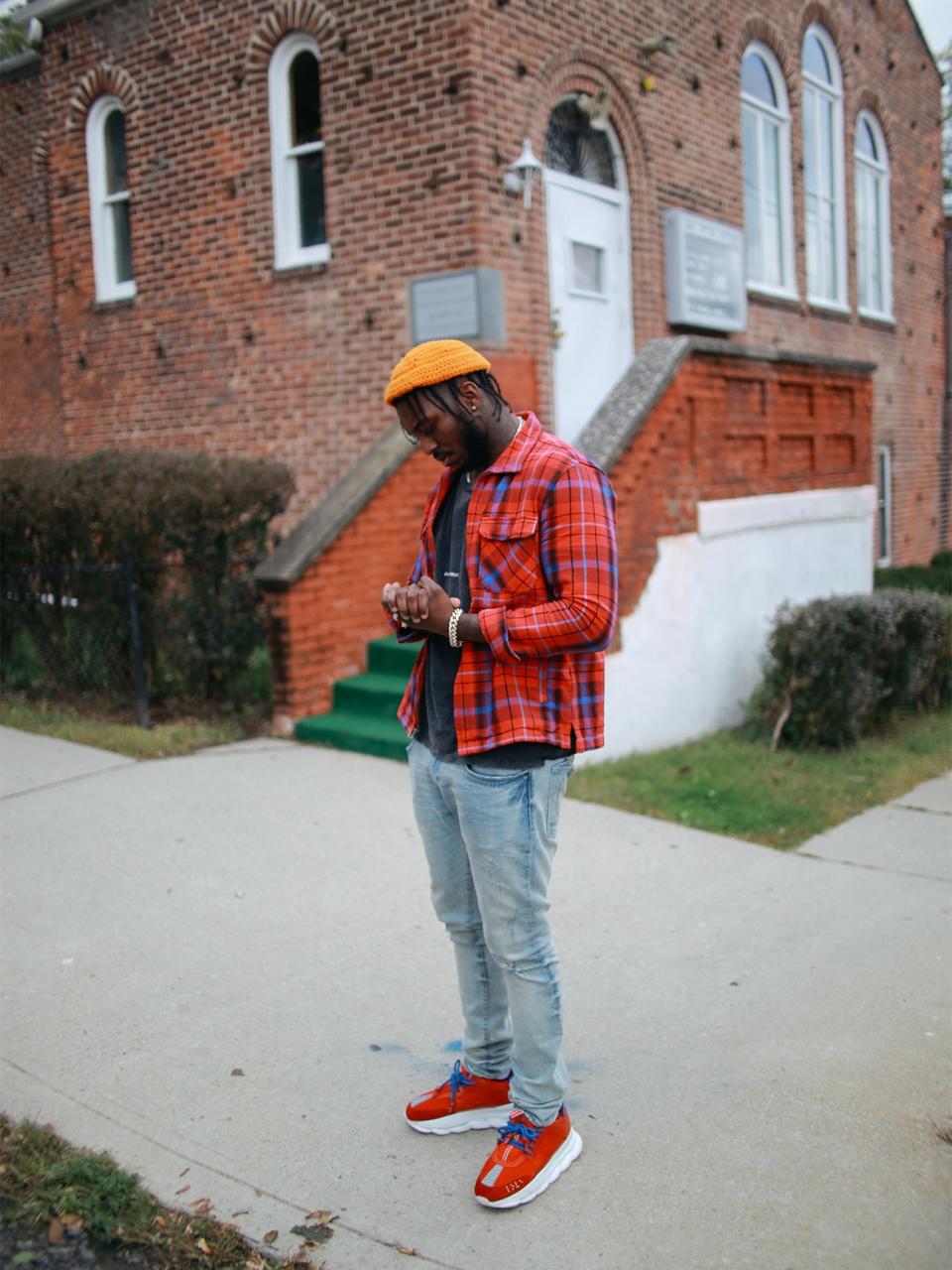
If you ask Pardison Fontaine what distinguishes him as an artist, he’ll tell you that it’s here, all around us in Newburgh. He’ll tell you that, sure, he thinks he sounds unique on the mic and is a clever lyricist. But what really separates him is that, by dint of him being from this small, forgotten upstate New York city, his story is one you haven’t heard before. It’s altogether different than the story of being from Atlanta, or L.A., or even Manhattan.
But how’s it different?
“It's a total different way of life up here,” he says. “We don't got the subways or cabs. And you know everybody. It's close-knit, but with the same amount of violence [as a big city]. And just seeing the stories that went untold… That's the real thing about my music. It's the common story that goes untold.”
The rapper-poet Saul Williams is one of the few Newburgh-born artists to make a name for himself. When I ask how growing up there shaped his art, he tells me that it gave him “a relationship to both Small Town U.S.A. and the hood and the prison industry and the school-to-prison pipeline.” He adds, “Sometimes I feel like Newburgh is a vortex. On the one hand, you have the dilapidated buildings and what have you. But if you get close to those buildings and find out who built them, there's a whole other world in discovering all this beautiful shit.”
Fontaine’s ability to transport listeners to an unfamiliar place and peel back its layers is what makes Charlamagne tha God think he could be special. "[Pardi] describes Newburgh in a way that’s vivid,” he tells me. “It’s like the way that Jay used to describe Marcy or Big used to describe where he was from in Brooklyn, or the way Snoop would describe L.A. I knew his whole life after listening to [Not Supposed to Be Here]."
This is about the biggest compliment Fontaine could get. But not just because he’s being mentioned in the same breath as three legends—it's also because Newburgh is being mentioned in the same breath as Brooklyn and L.A. That’s a big part of what made Pardi want to be a star at all. He wants to turn the world on to his town, and he wants to inspire the people in Newburgh to go out into the world. That’s why, while donating football jerseys is the ostensible reason he’s here today, taking selfies and signing autographs and infusing the Newburgh Activity Center with the light that radiates off a celebrity is just as important. “How can anyone know it's possible if you've never seen it?” Pardi says. “If I can make it easier for the next people coming up, I did exactly what I was supposed to do.”
He says this as he shows me the brick church he attended growing up. It sits at the intersection of two little streets that are empty but for a few teenagers taking turns riding a dirt bike with two flat tires. Everything is quiet and a little dead, until Pardi gets out of the car to pose for pictures. As he stands up on the church’s front steps, with his entourage all around and a camera flashing, the street isn’t quite reborn; but it’s seen, which can be the beginning.
